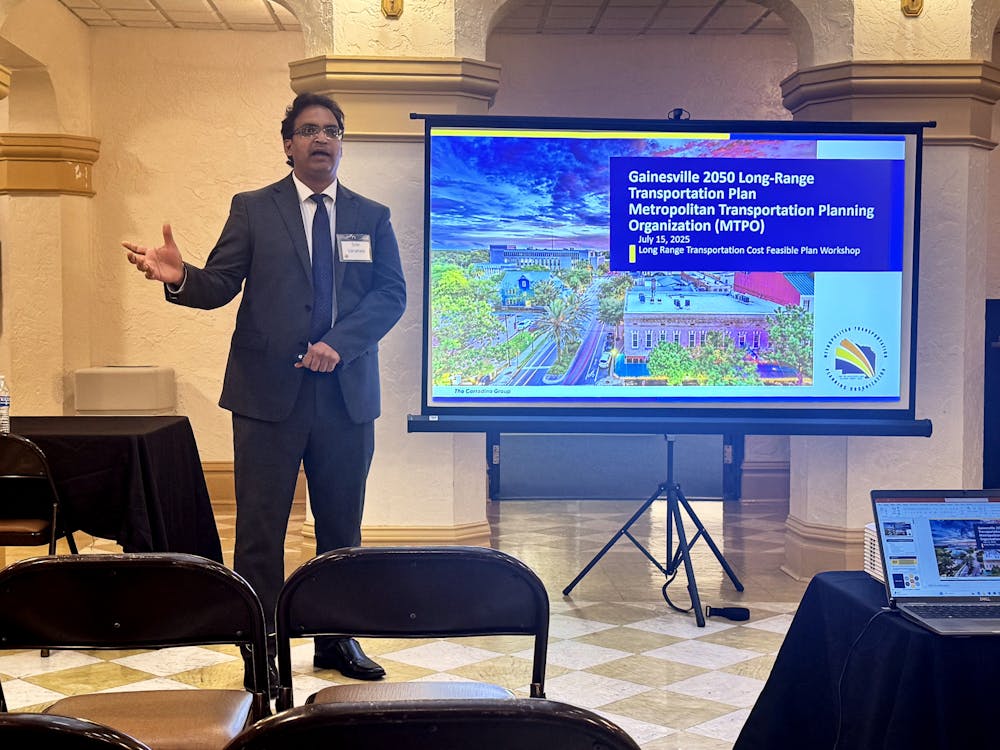The Metropolitan Transportation Planning Organization held its third public workshop Tuesday for its long-term plan for Gainesville and Alachua County’s public transit.
The workshop, held at the Historic Thomas Center on Northeast Sixth Avenue, sought public feedback for the organization’s 25-year roadmap. The presentation outlined nearly 200 planned projects, including 115 multimodal projects, 20 transit projects and 53 roadway safety projects, that it hopes to accomplish by 2050.
Srin Varanasi, the vice president of The Corradino Group, the engineering firm partnered with the city and county, led the presentation. In previous workshops, he said the public gravitated most toward projects that improve safety and accessibility.
The projects fall under “cost-feasible plans” tailored to implementing projects under specific budgets.
Multimodal projects improve sidewalks or bike lanes, where transportation occurs without a vehicle. Transit projects upgrade and expand bus systems, while roadway safety projects improve commercial roads.
Projects are organized by level of importance, which is determined by “objective as well as subjective principles,” Varanasi said. Objective principles are physical factors such as a lack of sidewalk space near a major road or inconsistent sidewalk widths. Subjective principles incorporate community feedback.
Projects that improve accessibility are higher priority on the group’s lists, he added.
“If there are vulnerable users on some of the high-volume roads, they need safety improvements,” Varanasi said.
About 25 community members, including city officials and residents, attended the workshop.
Noah Long, a 24-year-old Gainesville resident, said he was most interested in the multimodal projects. As a cyclist, Long said bike safety is one of his priorities. Improvements to bike lanes could ease the stress of traffic, especially as vehicular hours potentially increase, he said.
The planning organization projected that vehicular hours and miles, the time and distance vehicles travel, will increase substantially by 2050.
“Most major roads should have protected bike lanes in the city,” Long said. “If more major roads had protected bike lanes, I and many other people would cycle on them way more.”
Lucia Navia, a 24-year-old Gainesville resident, found roads outside central Gainesville are unfriendly to buses, cyclists and pedestrians. Congestion on roads like Archer Road and 34th Street could be improved by improving public transit accessibility, she said.
“If you do half [of the work] you do on I-95 for public transit, you would have so much less congestion,” Navia said.
Sherry Scoville, a 76-year-old Gainesville resident, attended the workshop because she has seen local public transportation “deteriorate,” she said. Gainesville’s bus system was one of the best in the country when she moved to Gainesville in 2016, she said, but progressive cuts — including a recent cut to Route 8 near her neighborhood — contributed to its decline.
“A few years ago, it was great,” Scoville said. “Now, it’s terrible because they’re not listening to constituents. They need to reassess and put money where it’s most needed.”
The Cost Feasible Plan adoption hearing will be held Aug. 19.
Contact Logan McBride at lmcbride@alligator.org. Follow him on X @logandmcbride.

Logan McBride is a journalism junior and a Spring 2026 track and field reporter. In his free time, he enjoys watching TV shows or playing basketball at Southwest Rec. He is also a big football fan and will die for Dak Prescott.






